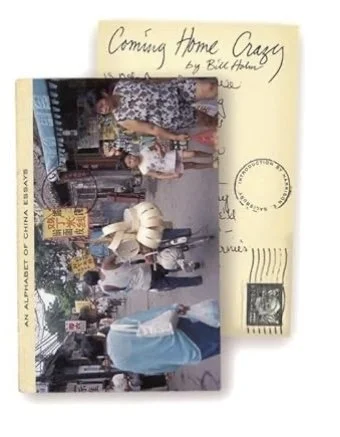Coming Home Crazy by Bill Holm (Milkweed Editions)
With ten rooms of books and over 3,500 sections, Powell’s City of Books has filled a city block in Portland, Oregon for the past fifty-three years, and claims to be the largest new-and-used bookstore in the world. It certainly is one of the most enticing, with its shelves filled with surprises and its cavernous rooms somehow managing to feel cozy. A trip to Powell’s is always a treasure hunt and it’s impossible to stick to a book budget when browsing in that place.
On a recent expedition, I made it to only two sections--Travel Literature and Asian History--and left with a book bag that strained at its seams. Among my purchases was a book whose title had always intrigued me but that I’d never read, Coming Home Crazy by Bill Holm.
Anyone who has lived anywhere in Asia, with the possible exception of Singapore, is going to come back to the West feeling a wild disorientation that verges on insanity. Holm cites The Crackup, where Scott Fitzgerald said he knew he was crazy when he couldn’t look at two opposing ideas at the same time. China, Holm says, has the opposite effect, as a place that makes it impossible to ever “see again singly.” People who return from the Middle Kingdom come home with a “bifurcated consciousness.” The antithesis to “every idea in your life and culture looks as sane and reasonable as the idea itself--” and sometimes even more so.
Although this beginning hints at a work of comparisons and contrasts, what follows is a collection of essays that follow a strange sort of alphabetical order, with a scrambled sense of time. After living with a language that can’t be alphabetized, Holm is delighted to point out the random nature of the A to Z classification. By beginning with an essay on AIDS and ending with a piece that explains the Chinese custom of zou houmen, (“going through the back door” to get a desired result), he creates a crazy quilt of unrelated patchwork pieces.
The only way to read this book is to ignore the alphabet. Holm offers suggestions that might give his readers a narrative thread but his choices are as idiosyncratic as his structure. After floundering in attempts to find a beginning, middle, and end, readers may find themselves wishing that Holms had simply published the journals that these pieces seemed to have emerged from.
Nevertheless, within the chaotic tumble of anecdotes and impressions there’s some very good writing and a Picassoesque portrait of what one city in China, Xi’an, felt like to a displaced Midwesterner from 1986-1987.
As a “waiguoren,” a Western foreigner, Holm was an object of curiosity, one that was inexplicable and fascinating. Reluctant to learn Chinese because it would strip him of his adult authority and take him back into childhood, he salutes his Chinese students in their study of English because they “exhibit a kind of courage” that he lacks himself. Swiftly he falls in love with the idea of teaching people who value books and are delighted to encounter English literature--”Whitman, Thoreau, Yeats…It was all candy, all delight.”
Holm is less than delighted with the frugal and Spartan comforts of his life in China but he finds an essential dimension in how the people find “celebration in their daily lives.” The ritual of making dumplings is one he explains step-by-step, from buying pork and vegetables in the market, to chopping, stuffing, and shaping in the company of friends in a home kitchen. Eating them is “a mountain, a dinner party, close to gluttony” and a sacrament of pure pleasure.
Pleasure is the hallmark of Holm’s essays. According to him, Nixon wasn’t the one who opened China to the West. Walt Disney did. Sunday evening was when people clustered around TV sets to watch Mickey, Minnie, Donald, and the gang cavort in an hour of cartoons.
And under a government of rigid control with a bloody history that would re-erupt on June 4 in 1989, Chinese people, Holm claims, are “anarchically free” so long as they avoid actions that are overt. The small regulations of daily living are freely and happily ignored in a society that he sees as operatic, “the Asian Italy.”
It would be interesting to go to Xi’an in 2024, decades after Holm spent his year there, to see how many of his observations still ring true. Carried as an anti-guidebook, his collection of impressions and opinions could launch explorations that may prompt surprise, delight, and a whole new attack of “coming home crazy.”~Janet Brown
